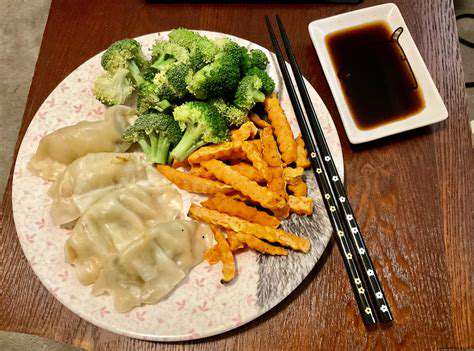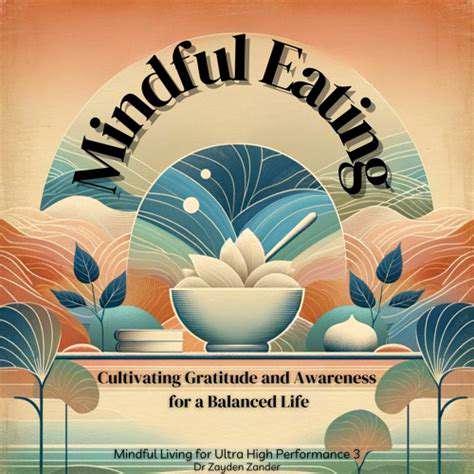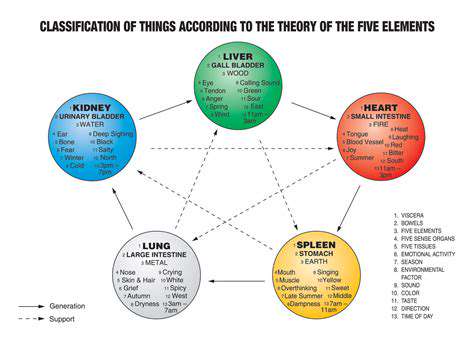TCM Food Therapy: Eating for Balance and Well being
Understanding the Interplay of Diet and Lifestyle
Traditional Chinese Medicine (TCM) emphasizes the interconnectedness of diet, lifestyle, and overall well-being. It posits that consuming foods aligned with one's constitution and incorporating practices like mindful eating and regular exercise can significantly impact health outcomes. This holistic approach goes beyond simply listing nutritional values; it delves into the energetic and emotional aspects of food and how they influence our physical state.
By understanding the interplay of these factors, individuals can cultivate a deeper appreciation for the profound impact their choices have on their overall health and happiness. This understanding is crucial for developing a sustainable and effective TCM food therapy regimen.
Mindful Eating Practices for Enhanced Digestion
Mindful eating, a cornerstone of TCM, encourages a slower, more conscious approach to meals. Paying attention to the textures, aromas, and flavors of food allows you to savor the experience and promote better digestion. By reducing distractions during meals, like screens and multitasking, you can fully engage with the nourishment you are taking in, allowing your body to properly process the food and absorb its nutrients.
This focused approach also helps to regulate appetite, preventing overeating and promoting a healthier relationship with food. By tuning into your body's hunger and fullness cues, you can achieve a more balanced and sustainable eating pattern.
The Significance of Regular Exercise in TCM
Regular physical activity is vital for maintaining balance within the body's energy channels, or meridians, as per TCM principles. Exercise helps to circulate Qi (vital energy) throughout the body, promoting overall health and well-being. Different forms of movement, such as tai chi, qigong, or brisk walking, can be beneficial depending on individual needs and preferences.
Finding an exercise routine you enjoy is key to sustainable practice. This not only improves physical health but also contributes to emotional well-being, reducing stress and promoting mental clarity, which are both crucial components of a balanced life according to TCM principles.
Stress Management Techniques for Harmonious Qi Flow
Stress significantly impacts the flow of Qi, often leading to imbalances within the body. TCM suggests various techniques to manage stress and promote harmonious Qi flow, including meditation, deep breathing exercises, and spending time in nature. These practices help to calm the mind, reduce anxiety, and promote a sense of inner peace.
Cultivating a sense of calm can lead to a more balanced and resilient state, allowing individuals to better navigate daily challenges and maintain overall well-being. Stress management is often interwoven with dietary choices in TCM, as certain foods can exacerbate stress responses.
Sleep Hygiene for Restorative Energy Renewal
Adequate sleep is essential for the body to repair and rejuvenate, crucial for optimal health according to TCM principles. Prioritizing sleep hygiene, such as establishing a regular sleep schedule, creating a relaxing bedtime routine, and ensuring a conducive sleep environment, can significantly impact energy levels and overall well-being.
Quality sleep allows the body to replenish its energy reserves and effectively regulate various bodily functions, leading to improved physical and mental health. Disrupted sleep patterns can lead to imbalances in Qi, impacting emotional and physical well-being, which is a key concept within TCM.
The Role of Emotional Harmony in Overall Well-being
TCM emphasizes the strong connection between emotions and physical health. Cultivating emotional harmony through practices like meditation, mindfulness, and spending time in nature can contribute to a sense of balance and well-being. Acknowledging and addressing emotional stressors, while practicing self-compassion, are vital steps towards maintaining optimal health.
Emotional well-being plays a critical role in maintaining the equilibrium of Qi, preventing stagnation, and promoting the overall harmonious functioning of the body. The connection between emotions, energy, and physical health is a cornerstone of the holistic approach found in TCM.











